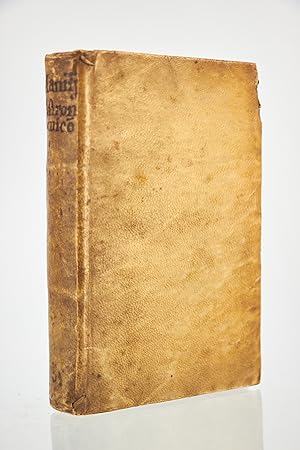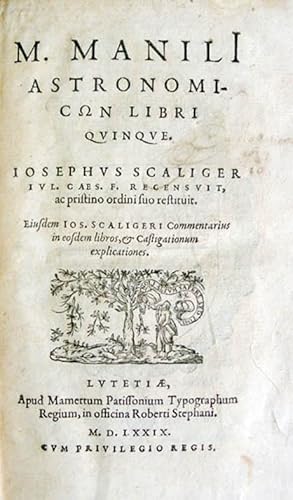scaliger joseph manilius (3 Ergebnisse)
Produktart
- Alle Produktarten
- Bücher (3)
- Magazine & Zeitschriften
- Comics
- Noten
- Kunst, Grafik & Poster
- Fotografien
- Karten
-
Manuskripte &
Papierantiquitäten
Zustand
- Alle
- Neu
- Antiquarisch/Gebraucht
Einband
- alle Einbände
- Hardcover
- Softcover
Weitere Eigenschaften
- Erstausgabe (2)
- Signiert
- Schutzumschlag
- Angebotsfoto
Land des Verkäufers
Verkäuferbewertung
-
M. Manili astronomicon libri quinque
Verlag: apud Mamertum Patissonium |[Mamert Patisson], |Roberti Stephani |[Robert Estienne], 1579
Buch Erstausgabe
Couverture rigide. - apud Mamertum Patissonium [Mamert Patisson], Roberti Stephani [Robert Estienne], Lutetiae (Paris) 1579, in-8 (10x16cm), (12)136pp. (8); 292pp. (10), 2 parties reliées en un volume. - Edition originale, rare. La première partie à pagination séparée est constituée par le texte de Manilius (caractères italiques), la seconde, qui possède sa propre page de titre et sa pagination, par les commentaires de Scaliger, lesquels sont deux fois plus long que le texte. Cette seconde partie est accompagnée de quelques diagrammes, notamment hors-texte. Marques de l'imprimeur sur les deux pages de titre. Plein Parchemin d'époque. Dos lisse avec titre à la plume noire. Coin droit manquant sur quelques mm sur le plat supérieur. Bordure ouverte sur 3 mm au plat inférieur. Les astronomiques de Manilius, poète let astrologue latin du début du premier siècle, est un poème didactique sur l'astronomie et l'astrologie. Le livre premier constitue une description du ciel, le second est consacré au zodiaque, le troisième apprend comment établir un horoscope d'après l'observation des cieux, le livre quatre est une analyse des peuples de la terre selon l'influence astrale, et le dernier livre une explication de l'influence des planète selon leurs positions. On notera que pour la première fois dans l'histoire de l'astrologie appraît dans ce texte le concept de "Maison", toujours utilisé. Les commentaires et réflexions de Saliger sont les premiers existants sur cet ouvrage. Scaliger, on le sait, fut un des plus importants érudit du XVIe siècle et succèda à Juste Lipse à L'université de Leyde. Son intérêt pour la chronologie, l'astrologie et l'astronomie l'a accompagné sa vie durant. Ses détracteurs lui reprochèrent cependant en ce domaine une approximation dans ses sources et une certaine erreur dans ses jugements sur l'astromie ancienne. [ENGLISH TRANSLATION FOLLOWS] Apud Mamertum Patissonium, Roberti Stephani (Mamert Patisson, Robert Estienne), Lutetiae (Paris) 1579, in-8 (10x16 cm), (12)136pp(8); 292pp(10), 2 parts bound in one volume First edition, rare. The first part has separate pagination and consists of the text by Manilius (italics), the second part, which has its own title page and pagination, contains Scaliger's commentary, which is twice as long as the text. This second part is accompanied by several diagrams, including inset. Printer's marks on both title pages. Full contemporary parchment. Spine with title in black ink. Right corner missing a little on the upper board. Open 3mm border on the lower board. Manilius' Astronomica, Latin poet and astronomer from the beginning of the first century, is a didactic poem on astronomy and astrology. The first book is a description of the sky, the second is devoted to the zodiac, the third teaches how to establish a horoscope by observing the skies, the forth book is an analysis of the peoples of the earth according to the astral influence, and the last book gives an explanation of the influence of the planets according to their positions. It will be noted that for the first time in the history of astrology the concept of "House", that is still used, was mentioned. Scaliger's commentary and reflections are the first to exist on this work. Scaliger, as we know, was one of the most important scholars of the 16th century and succeeded Justus Lipsius at Leiden University. His interest in chronology, astrology and astronomy accompanied him throughout his life. However, his critics criticised him in this field for an approximation in his sources and a certain error in his judgments on ancient astronomy. (12)136pp. (8); 292pp. (10).
-
M. MANILI ASTRONOMICON LIBRI QUINQUE. Eiusdem Ios. Scaligeri commentarius in eosdem libros, et castigationum explicationes.
Verlag: Tip. Mamert Patisson ("Apud Mamertum Patissonium."), en la oficina de Robert Stephan. París, 1579, 1579
Anbieter: Libreria Anticuaria Farré, Barcelona, BARCE, Spanien
Erstausgabe
. 18 cm. Dos tomos: (I) 6 h., 136 pág., 4 h. (II) Iosephi Scaligeri. In Manili quinque libros astronomicon commentarium et castigationes. 292 pág., 6 h. Texto en latín y griego. Ilustr. con grabados, en el texto. Cada tomo con portada propia con marca tipográfica. En el verso de la portada del primer volumen hay un escudo grabado. Dos tomos enc. en un vol. en plena piel, nervios, florones, ruedas en ambos planos, cortes pintados. Pequeña señal de taladro restaurado en el margen de las últimas 30 páginas. * Esta obra se divide en dos partes: la primera es el poema de Marco Manilio sobre astronomía y astrología, y la segunda son los comentarios de Scaliger. Marco Manilio escribió este poema didáctico alrededor del año 10 d. C. Es el poema más antiguo que se conoce sobre el tema y es donde aparece por primera vez mencionado el sistema astrológico de las doce casas. Se divide en cinco libros: el primero es una descripción del cielo y del origen del mundo; el segundo versa sobre el zodíaco; el tercero sobre la elaboración del horóscopo; el cuarto analiza la influencia de los astros en los diferentes pueblos, y el último explica la influencia de los planetas según su posición. Esta edición es la primera edición crítica, publicada por Joseph Justus Scaliger (1540-1609), destacado humanista conocido porque fue el primero en poner de relieve la importancia en la historia y el pensamiento antiguos de las civilizaciones persa, babilonia, egipcia y también la judía. Estos comentarios al poema de Manilio constituyen en realidad un tratado sobre astronomía, ya que Scaliger no sólo se refiere a los saberes de la antigüedad, sino también lo enriquece con los conocimientos astronómicos de científicos de su época como Copérnico. CCPB 870257-8. Astronomía.
-
Astronomica [with] Commentarius
Verlag: Roberti Stephani, 1579
Anbieter: Sokol Books Ltd. ABA ILAB, London, Vereinigtes Königreich
Buch
Hardcover. Zustand: Good. 8vo. 2 parts in 1. Pp. (xii) 136 (viii); Pp. 292 (xii). Italic and Roman letter. Printer s device to both tps, arms of the dedicatee Henri III to verso of first, ornamental head and tail pieces and initials. Astrological diagrams to 7 pages of second part, one shaved a little at fore edge. Age yellowing, two minor marginal worm holes to first tp, light marginal water stain to fore edge of first part, foxing and spotting, mainly to second. A good copy in C17 vellum, red morocco label, aeb. First edition published by Joseph Scaliger of this very early didactic poem on astrology by Roman poet Marcus Manilius (1st c. AD). Joseph Scaliger (1540-1609), a French Calvinist and humanist was the first to critically edit Manilius s enigmatic work since the editio princeps published in Nuremberg in 1473 by the astronomer Regiomontanus. The poem is divided into five books and is accompanied by a second part containing Scaliger s extensive commentary as well as astrological diagrams to seven pages. The poem itself demonstrates influence from Lucretius s De rerum natura and describes the zodiac and Roman astrology. Manilius s identity is shrouded in mystery, as is when he wrote the work. The only historical event explicitly mentioned is the Battle of the Teutoberg Forest, leading scholars to suggest a date in the early-mid 1st century AD. Volk (2009) states that the poem is the earliest surviving extensive and comprehensible work on astronomy and astrology. The five books commence with the origin of the universe and the nature and composition of earth and space. The orbit of planets is discussed in depth as well as each zodiacal sign and birth charts, horoscopes and ascendants. Following this classical myths are used as vehicles for considering celestial phenomena. Stoic, Platonic, Pythagorean and Epicurean views are all present and modern scholars consistently praise the complex and elegant writing style of the poem. Housman (1916) exclaimed that Manilius was the one Latin poet who excelled even Ovid in verbal point and smartness . Scaliger established himself as the preeminent Latin scholar and critic of his day through the publication of this 1579 critical edition. His commentary is essentially a treatise on ancient astronomy and it forms an introduction to his later publication De emendation temporum (1583) which sought to expand the contemporary perception of ancient history from just Greeks and Romans to Persians, Babylonians and Egyptians. Indeed, Manilius s identity as a Roman was much debated and questioned; he has been suggested to be an African or Asiatic Greek. Scaliger s edition reintroduced Manilius to the scholarly world and led to many later editions including Boeckler s, Bentley s and Housman s. Adams M361; Smitskamp, The Scaliger Coll., 97; Dibdin II 224; Ren 181:4; Houzeau & Lancaster 1037; Grassi p. 434.




![Bild des Verkäufers für Astronomica [with] Commentarius zum Verkauf von Sokol Books Ltd. ABA ILAB](https://pictures.abebooks.com/inventory/md/md30917522759.jpg)